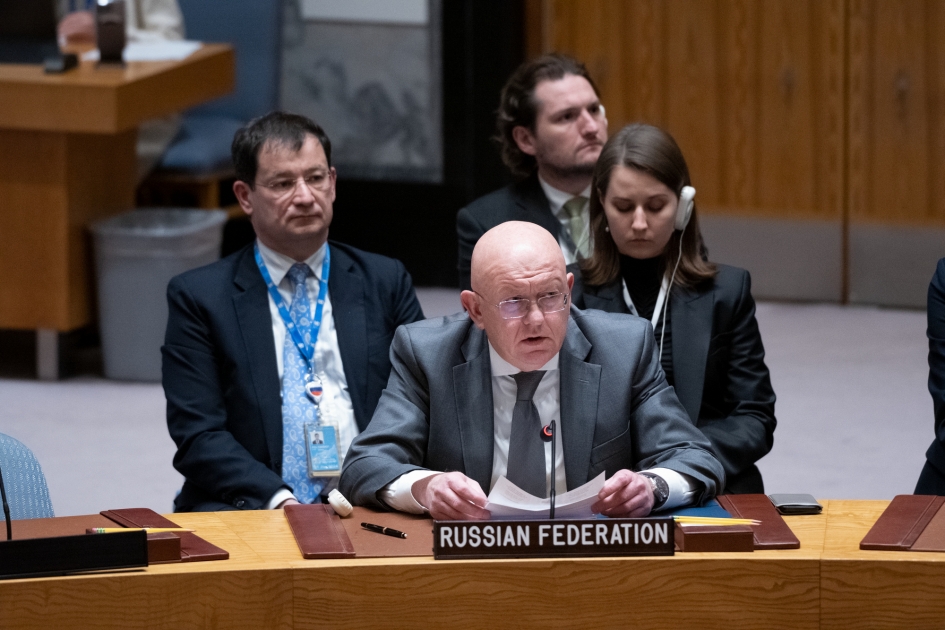Explanation of vote by Permanent representative Vassily Nebenzia after UNSC vote on a draft resolution (put forward by Malta) on the situation in the Middle East, including the Palestinian question
Mr.President,
Russia abstained during the vote on the draft resolution proposed by Malta. We could not but respond to calls, including from countries in the region, for the UNSC to adopt at least some humanitarian product. That is the only reason why we turned a blind eye to the many shortcomings of the draft, the main one being the absence of a call for an immediate ceasefire. This was and remains an imperative. Any humanitarian action requires an immediate cessation of hostilities. One cannot clear the debris and evacuate people when under fire, and also it is impossible to bring in much-needed fuel, without which Gaza's hospitals are about to run out of energy. Besides, without fuel supplies, in the coming hours (according to UNRWA forecasts on November 16), the residents of Gaza will find themselves without any communications, without Internet and in a complete isolation from the outside world. There will be no telling what happens there at all. The Gaza Strip will be completely plunged into darkness and chaos, and coordination among emergency services will be disrupted.
At this very moment, while delegations to the Security Council are exercising in eloquence, the Israeli army is raiding Al-Shifa hospital, bombing UNRWA schools, and there are alarming reports of medical staff being shot, medical equipment and medical depots being destroyed.
I stress once again: humanitarian pauses are not and cannot be a substitute for a ceasefire or even a truce. It is only a short-time halt, after which hostilities resume with renewed vigor. That is, the people who will have been evacuated will get under new bombardments, the destruction of civilian objects will continue, and there will be more and more casualties.
I wish to draw your attention to the letter that the Mission of Palestine circulated today in the Council, which asks for an immediate ceasefire.
Mr.President,
From the very beginning of the current escalation in the Palestinian-Israeli conflict zone, the US delegation has sabotaged any attempt to develop a balanced and depoliticized document aimed at taking real and urgent measures to de-escalate the situation. Our American colleagues on the Council justified the collective punishment and annihilation of the Palestinians, first of all the civilian population, under the slogans about the fight against terrorism and Israel's right to self-defense, effectively paralyzing the work of the main UN body for the maintenance of international peace and security. Washington has consistently rejected draft resolutions demanding a humanitarian ceasefire.
My American colleague just lamented that the Council cannot condemn the actions of Hamas on October 7. She criticized those who prevent it. I would advise her to recall the timeline. It was the United States that on October 18 vetoed Brazil's draft resolution condemning this action. Russia and Great Britain abstained then, while the rest voted in favor. Therefore, the United States has only itself to blame.
We regret that, under pressure from Washington, the language of the resolution has been emasculated - the Council does not even demand humanitarian pauses, but only calls for them, which is a mockery of the Council's prerogative. Colleagues, it is a shame that the Council, which has a uniquely powerful toolkit, including Chapter 7 of the UN Charter, could only manage to produce such a weak appeal. That reminds me of a saying about a “mountain in labor” that gave birth to a mouse.
In the past weeks, all representatives of the United Nations humanitarian agencies and the Secretary-General himself have been asking for a humanitarian ceasefire with one voice. It was for that purpose that we proposed the relevant amendment to the draft. We are deeply disappointed that it did not pass. Some do not care about the effectiveness of the Council's response; the main thing is to show that the Council has adopted "something that is humanitarian".
We have the most serious concerns that the provisions of the resolution will not be implemented on the ground. Who will consent to humanitarian pauses? Who will monitor and verify them, and what will be the consequences of non-compliance? The adopted resolution will therefore not contribute to resolving the humanitarian crisis in which the Gaza Strip and its population find themselves. We trust that the Secretary-General will report on the implementation of the resolution at the next meeting of the Security Council on the Middle East and present the Council with options for establishing mechanisms for international monitoring of the process as soon as possible. The Council needs to decide on further actions - what observers to send to the conflict zone and what United Nations contingent will be involved. We will follow this closely and will not allow this issue to be bogged down.
What remains a priority is the adoption of a full-fledged, strong product of the Council with an unambiguous call for an immediate ceasefire. We trust that work on it will begin very soon.
Thank you.
